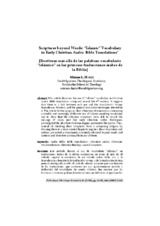Scriptures beyond Words: “Islamic” Vocabulary in Early Christian Arabic Bible Translations
Escrituras más allá de las palabras: vocabulario “islámico” en las primeras traducciones árabes de la Biblia
Autor
Hjälm, Miriam L.
Editor
Universidad de Córdoba, UCOPressFecha
2018Materia
Arabic BibleBible translations
Christian Arabic
Christian-Muslim relations
Christian theology
Sacred Scriptures
Biblia árabe
Traducciones de la Biblia
Árabes cristianos
Relaciones cristiano-musulmanas
Teología cristiana
Sagradas Escrituras
METS:
Mostrar el registro METSPREMIS:
Mostrar el registro PREMISMetadatos
Mostrar el registro completo del ítemResumen
This article discusses the use of “Islamic” vocabulary in Christian Arabic Bible translations composed around the 9th century. It suggests that there is a link between such use and the translation’s Vorlage dependence, function, and the general translation technique attested in it. The article further proposes that a function of translations containing a notable and seemingly deliberate use of Islamic-sounding vocabulary was to show that the Christian Scriptures were able to absorb the message of Islam, just like early Christian Arabic theologians promulgated the idea that Christian dogmas permeated the Qurʾān. Thus, instead of shielding their Scriptures from a competing religion by dressing them in a more neutral linguistic register, these translators and authors presented a Christianity essentially elevated beyond words and contexts and therefore portrayable in any of them. Este artículo discute el uso de vocabulario “islámico” en traducciones árabes de la Biblia, compuestas en torno al siglo IX. El artículo sugiere la existencia de un vínculo entre dicho uso y la dependencia y función de la traducción Vorlage, y de la traducción técnica general atestiguada en ella. El artículo además propone que una función de las traducciones, que contienen un uso aparentemente notable y deliberado del vocabulario de sonido islámico, fue mostrar que las Escrituras cristianas podían absorber el mensaje del Islam, al igual que los primeros teólogos cristianos árabes promulgaron la idea de que los dogmas cristianos calaron en El Corán. Por lo tanto, en lugar de proteger sus Escrituras de una religión competidora, vistiéndolas en un registro lingüístico más neutral, estos traductores y autores presentaron un cristianismo esencialmente elevado más allá de las palabras y los contextos y por lo tanto representable en cualquiera de ellos.

